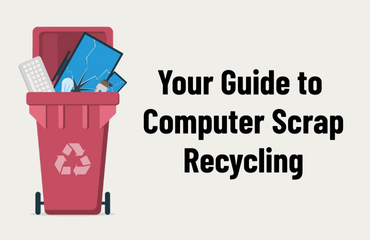In the rapidly changing digital world, proper computer scrap recycling ,electronic waste, or e-waste, is more critical than ever. As our dependence on technology grows, so does the need for sustainable practices. This is where recycling of computer scrap comes into play, offering a solution that goes beyond merely discarding old gadgets. It involves a responsible approach that is both environmentally friendly and beneficial for our collective well-being…
Recycling old computers at home may appear convenient, but opting for specialized recycling services is generally a wiser choice. These services ensure the proper and secure handling of the recycling process. They possess the experti e-waste recycling company to dismantle electronic devices, separate components, and recycle each part in an eco-friendly manner. While the do-it-yourself approach may suffice for some elements, relying on professional services guarantees a more thorough and environmentally sound recycling process for your old computer.
Why Computer Scrap Recycling Matters
E-Waste Pollution
As technology evolves, the improper disposal of computers contributes significantly to e-waste pollution. Computer scrap recycling in India becomes crucial to prevent hazardous substances from harming our soil and water, safeguarding ecosystems.
Hazardous Materials in Computers
Computers contain potentially harmful materials. Computer parts recycling ensures these materials don’t harm the environment, safeguarding ecosystems and human health.
The Process of Computer Scrap Recycling:
Collection and Sorting
The initial step involves meticulous collection and sorting of electronic devices, enhancing the efficiency of the recycling process. Proper categorization ensures the maximum recovery of valuable resources.
Disassembly and Component Separation
Skilled technicians carefully disassemble electronic devices, separating components like circuit boards, batteries, and plastics. This process forms the foundation for effective computer scrap dealers near you.
Recycling Methods
In the recycling process like IT scrap recycling has various methods, from mechanical processes for metal separation to advanced techniques like pyrolysis and hydrometallurgy, are employed. The goal is to extract valuable materials while minimizing the environmental impact.
Importance of Computer Scrap Recycling
Conservation of Resources
Recycling computers conserves valuable resources like metals, reducing the need for extensive mining and extraction. This promotes sustainable resource management.
Reduction of Landfill Waste
By diverting electronic devices from landfills, computer scrap recycling lessens the burden on waste disposal sites, preventing the release of harmful substances into the environment.
Economic Opportunities
The recycling industry, especially computer scrap recycling, not only contributes to environmental sustainability but also fosters economic opportunities, nurturing job creation and innovation.
Challenges in Computer Scrap Recycling:
Lack of Awareness
Insufficient awareness about proper e-waste disposal poses a significant challenge. Effective educational campaigns are crucial to emphasize the importance of computer recycling.
Technological Obsolescence
The rapid pace of technological advancement leads to shorter device lifespans, resulting in a surge of obsolete electronics. Effective recycling strategies must adapt to this fast-paced cycle inherent in computer scrap buyers.
Global E-Waste Trade
The global trade of e-waste poses challenges, involving exporting waste to developing countries. This highlights the necessity for international cooperation and regulation in recycling of IT equipment scrap.
Encouraging Sustainable Practices:
Promoting Extended Producer Responsibility
Assisting manufacturers to take responsibility for the entire lifecycle of their products promotes sustainable practices, reducing the environmental impact of electronic devices.
Encouraging Responsible Consumer Behavior
Educating consumers on responsible e-waste disposal and endorsing eco-friendly products contributes to sustainable practices at the individual level, reinforcing the importance of computer recycling.
Innovations in Recycling Technologies
Continued research and development in recycling technologies pave the way for more efficient and environmentally friendly processes in computer scrap disposal.
Future Trends in Computer Scrap Recycling:
Advancements in E-Waste Management
Ongoing advancements in e-waste management, including improved recycling technologies and waste tracking systems, shape the future of sustainable electronic waste disposal, including computer scrap recycling.
Circular Economy Initiatives
Embracing the principles of a circular economy, where products are designed for longevity and recyclability, is crucial for reducing the environmental impact of electronics, aligning with the ethos of recycling the computers.
Real-Life Examples:
Successful Computer Scrap Recycling Programs
Scrutinizing successful recycling programs worldwide provides insights into effective strategies, encouraging the adoption of best practices in computer scrap management.
Companies Leading in E-Waste Management
Highlighting companies taking proactive measures in e-waste management, particularly in computer recycling, underscores the positive impact of corporate responsibility.
How Individuals Can Contribute:

Proper Disposal Methods
Embracing proper disposal methods, such as utilizing e-waste collection centers, ensures the responsible recycling of electronic devices, especially those amenable to computer electronics recycling.
Supporting E-Waste Collection Initiatives
Supporting and participating in local e-waste collection initiatives enhances the accessibility of recycling options for communities, contributing to the broader goal of computer scrap recycler.
Raising Awareness
Spreading awareness about the environmental consequences of improper e-waste disposal motivates individuals to make conscious choices, fostering a culture of responsibility, particularly in recycling of computer or laptop scrap.
Conclusion: A Call to Action
Armed with knowledge about the benefits and challenges in computer scrap recycling, it’s time for a collective call to action. Embracing sustainable practices in computer recycling ensures a healthier planet for future generations. Let’s work together to make a positive impact on our environment.
FAQs on Computer Scrap Recycling:
-
What materials can be recycled from computers?
Computers have various recyclable materials, including metals, plastics, glass, and circuit boards.
-
How can I find places to recycle old computers in my area?
Online searches or inquiries with local waste management authorities can provide information about locations for recycling old computers nearby.
-
Are there rules for recycling old computers?
Yes, many countries have stipulations regarding the recycling of electronic waste. Adhering to these rules is imperative for responsible disposal.
-
Can I recycle my old computer at home?
While certain components may be amenable to home recycling, opting for specialized recycling services ensures a proper and secure disposal process.
-
What happens to my data when I recycle my old computer?
Reputable recycling facilities employ methods to securely erase personal data from old computers before initiating the recycling process.

